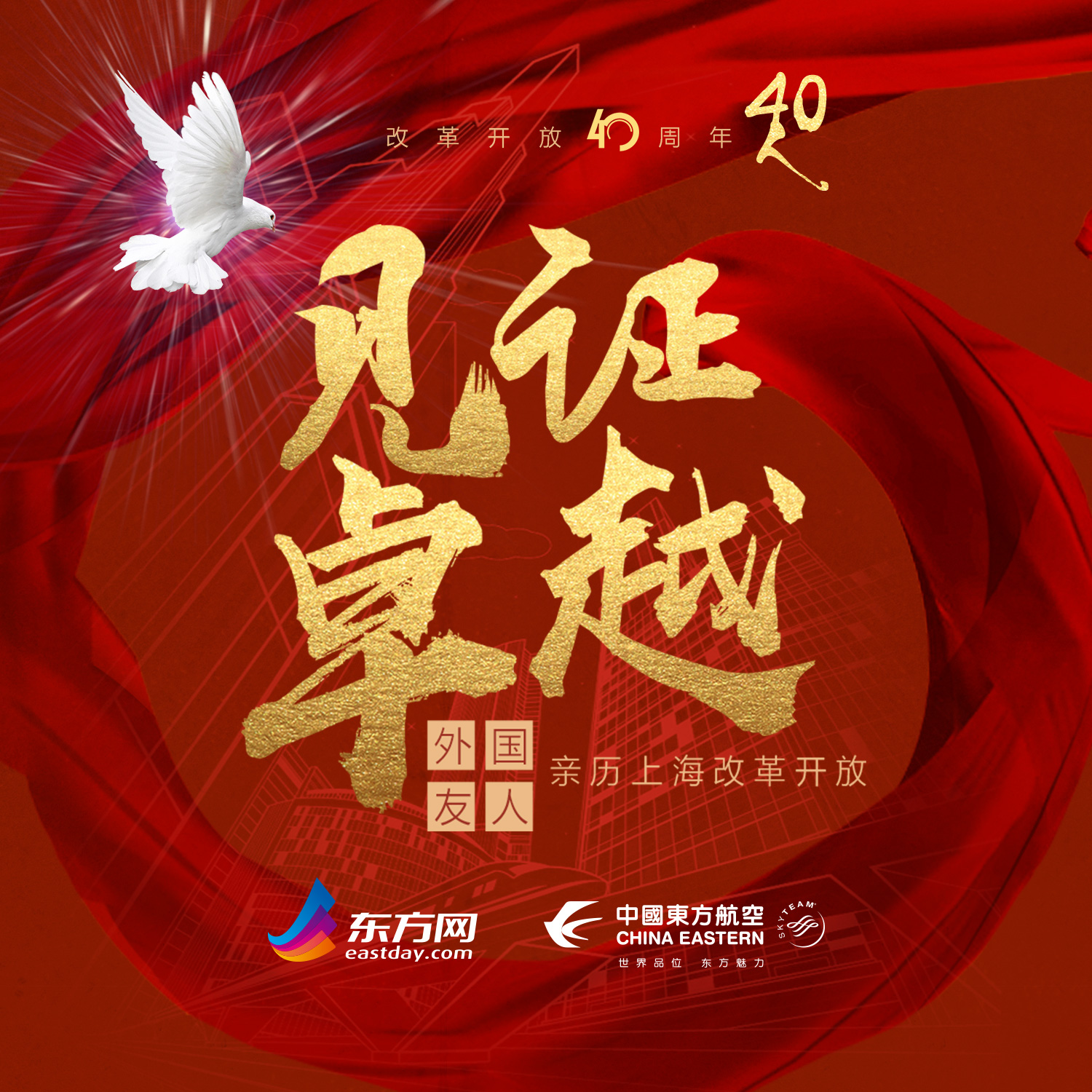



english.eastday.com
Zheng Qian
2018年9月28日 09:28:49
I have never experienced the changes of China in my Canadian hometown
With a brown plaid shirt and a soft voice, Bryan’s gentlemanly manners match his identity as a teacher. However, this seemingly quiet young man has being longing for unfettered freedom and likes to explore the world. And that was exactly the reason why he came all the way to China.
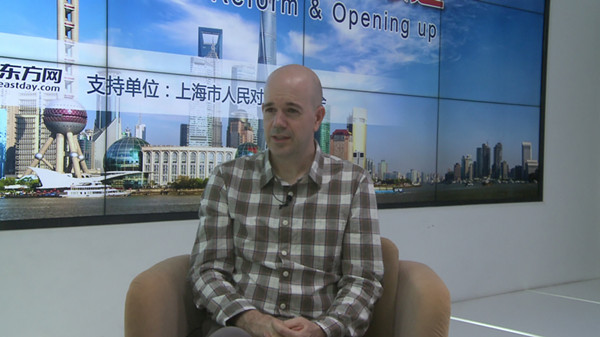
Bryan Keith Fordham, a foreign teacher from the No.2 high school of East China Normal University, receives an interview from Eastday.com.
Coming to China to experience Chinese culture
Bryan was born in St. Andrews, a beautiful coastal town in New Brunswick, Canada. He came to China for the first time in 2009. Before that, he worked as a computer programmer in the United States for ten years. Since he always wanted to have a change and likes Chinese language and teaching, he finally chose to leave for China and got a position in Huanghe S&T University in Zhengzhou, central China’s Henan Province.
When asked why he didn’t come to Shanghai but Zhengzhou, a third-tier city, his answer was very special.“Because Shanghai is an international metropolis and has many foreigners. I know my character. I will speak English with others and not practise my Chinese.”
Bryan has taken his English language advantage as a stepping stone. He said,“It was very easy to teach English in China at that time. China needed and still needs a lot of Oral English teachers. Many places are interested in improving students' English.” However, he was obsessed with science teaching since his major was mathematics and science. So he moved to Zhengzhou Middle School to teach mathematics three years later. After living in Zhengzhou for four years, Bryan wanted to try a new city. So he came to Shanghai in 2014.
As he had expected, Bryan, upon first arriving in Shanghai, felt the internationalization of the city. Here, he did not feel "unique" as he had when he first arrived in Zhengzhou ten years earlier.
Bryan took to teaching at No.2 high school like a duck to water. Founded in 1958, this school is the only national key middle school in Shanghai directly affiliated to the Ministry of Education. It is known for its high quality teaching at home and abroad. Founded in 1999, the International Department is one of the five public international departments approved by the Shanghai Municipal Government to recruit foreign students aged from 12 to 18 for credential schooling.
In China, the school represents the reform and innovation of basic education. Since the end of the 1980s, the school has carried out in-depth educational reforms in all aspects, and has piloted national science classes and Shanghai science classes in high schools to conduct experimental research on the education model of science education integrated with humanities education. At the turn of the century, it established the first "master teacher system" in the country.
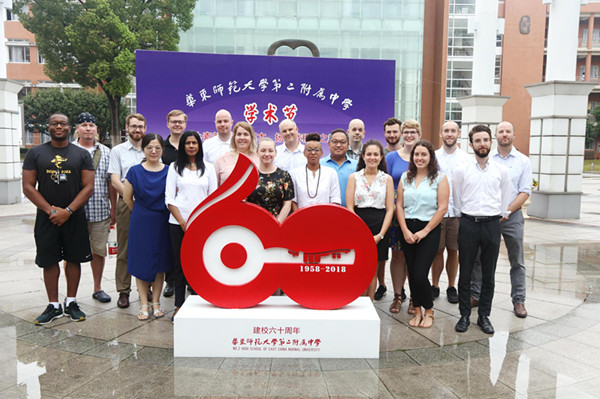
Group photo of foreign teachers from the International Department of the No.2 high school of East China Normal University
Here is also a symbol of Shanghai’s educational opening. Not only is the student body internationalized, with almost 400 international students, the teaching group, curriculum and student activities are also internationalized. Since the 1980s, with the teacher improvement program supported by UNESCO, the school has sent a number of key teachers to the United States, Britain, Japan and other countries for advanced education and long-term study, and to learn superior skills in international education.
In terms of courses, the computer elective course was piloted in the 1980s. The English group took the lead in using the New Concept English 2 series as its teaching book. In the 1990s, the mathematics team selected a high school mathematics textbook edited by professor Xiang Wuyi of the California Institute of Technology; a physical group pilot in the early 21st century using German high school textbooks; and the English group has introduced a Cambridge English course in recent years. The school has been more committed to the integration of Chinese and Western courses in recent years. The international course class approved in 2014 has piloted more than 10 US AP (Advanced Placement) courses – where Universities work in partnership with secondary schools - and has striven to integrate Chinese pre-requisite courses and AP courses, as well as realize the Sino-US curriculum integration in the field of high school mathematics and physics.
In terms of overseas students activities, when focusing on Chinese language education and Chinese culture courses, the school promotes mutual visits between teachers and students from sister schools overseas to achieve international cultural exchanges. As for Chinese students, the school encourages participation in a variety of internationally influential events, such as the International Middle School Students' Olympic Olympiad, the Intel International Science and Engineering Competition, the Iran International Mathematical Invitational Tournament, and the American High School Students Mathematical Modeling Competition.
Feeling China's reform and opening up
The entry of foreigners like Bryan into the Chinese education industry is a microcosm of the tremendous development of the Chinese education industry over the past few decades. Starting from the end of the "Cultural Revolution" in 1977 and the resumption of the national unified college entrance examination system, contemporary Chinese education has gone through 40 years’ development and reform. In July 1978, Fang Yi, then vice premier of the State Council and director of the State Science and Technology Commission, held talks with visiting US scientific and technological delegations. After several rounds of consultations, the two countries decided to exchange international students. After this meeting, the prelude of an era has been opened---Chinese education has moved from self-reliance to cooperation and mutual benefit.
During the forty years of integration and exchange, Chinese education has not only "gone out" but also "brought in”. China not only sends students to study abroad, but also lets Chinese educational institutions jointly run schools with foreign ones and introduce foreign high-quality educational resources including talents, equipment, and ideas. Take No.2 high school of East China normal university as an example, where in recent years foreign teachers, returnees and new teachers with overseas research experience have been vigorously introduced, resulting in the proportion of international teachers being over 20%.
Bryan is very satisfied with his school's high quality of international education in China. He explained that he teaches science and AP calculus in the school, focusing on developing students' critical thinking and problem-solving skills. The International Department's students come from more than 20 countries and regions. Up to now, the Department has trained nearly 500 international students, and 90% of them have been admitted to famous universities at home and abroad. In response to the different educational backgrounds and learning objectives of international students, the International Department adopts a different curriculum for each student. It also strengthens Chinese language teaching and Chinese culture education for international students to cultivate students' understanding and tolerance of multiculturalism.
Speaking of the school's exchange program, he is full of praise."Every year, exchange students from all over the world come to our school to study. I think this is an excellent chance for students to experience another country." If I was talking to somebody in Canada, I would definitely recommend taking the chance to see exactly what another country is like, especially China. China is a very large country, a very influential country. It’s nice to have a sense what that’s like to be there, as opposed to only just hearing about a place in the news. If you have a chance to meet people, talk to people and see what their life is like, I think it is always beneficial.”
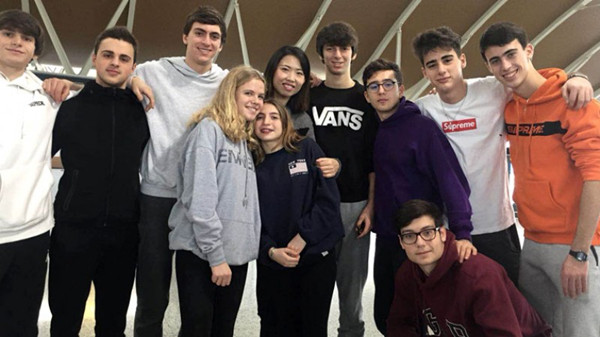
Exchange students from Italy to No.2 high school of East China Normal University pose for a group photo
Speaking of his life in China in the past ten years, he said that his daily activity is mainly teaching at school. However, from his wife, a Shanghainese, he has learned how China and Shanghai have changed in the past few decades.“Shanghai has changed a lot since the reform and opening up. For example, the Shanghai subway is very developed today, and it is very convenient to go anywhere. In addition, there are many high-rise buildings in Shanghai. Shanghai has not only retained the traditional Shikumen buildings, but also has modern constructions. In general, Shanghai is in line with international standards. The shopping and transport are all different from the past. I like Shanghai very much.”
This change is more obvious when compared with his own hometown."I come from a small town in Canada called St. Andrews. There are only 18,000 people. It has not changed in 160 years, the same streets, the same buildings. So the kind of development Shanghai has gone through is not something that we experienced in my hometown of Canada. I am very aware how much change Shanghai and China have gone through in the last number of decades."
Bryan, who loves exploring, always likes to travel to various places during the holidays. He praises that China's transportation is now very convenient."From my perspective, as a Canadian, one of the benefits of China is that it is easy to travel anywhere. In Canada, If you want to travel, you must have a car. If you go far, you have to take a flight. But in China, you can travel easily by train."
For his life in Shanghai, his calm tone conveys satisfaction."I really like Shanghai. I have been here for more than five years. Now I am not planning to leave. I am married, and have a child on the way. My life in Shanghai is very good. Shanghai offers many opportunities, it’s an international city, I feel I have everything I need to have a comfortable life."
What most impresses him is the development of Chinese technology. He said that No.2 high school of East China Normal University is located in the Zhangjiang Hi-Tech Park in Pudong. He can see how many technology companies there are in the district every day and feels a strong high-tech atmosphere."I am quite impressed by how much effort Shanghai has made for technological research and progress."
Bryan, who has already integrated into China, sincerely looks forward to the future development of China's science and technology, especially in health care.“As a Science teacher I pay attention to news that relates to the different sciences and in particular when those news stories are about China. As I am getting older, I find I am more interested in the news stories related to health science especially related to cures for disease or understanding what happens to the body as we get older.” He specially mentioned the field of genetic editing and praised China for being a leader in this world.“I am very excited to see how China will progress in technologies like CRISPR,” he said with a firm-looking expression.
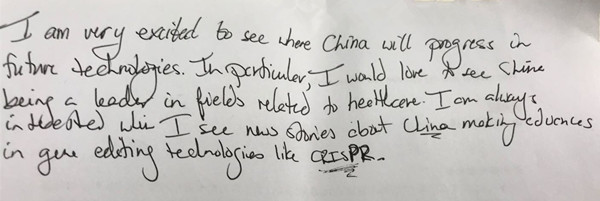
Bryan's wishes for China to deepen reform and opening up, expecting China to lead the development in science and technology.